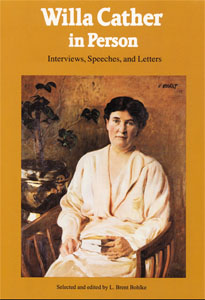from Willa Cather in Person: Interviews, Speeches, and Letters
Selected and edited by L. Brent Bohlke
Lincoln & London: University of Nebraska Press, 1986
1912: NEW YORK
Alexander's Bridge, Cather's first novel, brought about her first authentic interview in a weekly feature of the New York Sun entitled "Literary News, Views, and Criticism." Cather clipped the interview, marked it with heavy black lines, and sent it home to her family (Willa Cather Pioneer Memorial Collection). It is one of the rare instances when she talked at any length about the book. Unsigned, the interview would seem to indicate that Miss Cather dominated after the opening sentence, to the extent of repeating the interviewer's questions. Her later interviews clearly show, however, a different style. "Certainly, " "Not at all," and "Certainly not," are the far more characteristic, terse responses that she made to questions.
This interview was drawn upon heavily but not identified by Grant M. Overton in his chapter on Cather in the first edition of The Women Who Make Our Novels (New York: Moffat, Yard and Company, 1918).
EXPLAINING HER NOVEL
Alexander's Bridge Has Nothing to Do with Whist
Willa S. Cather has been kept busy denying that her novel Alexander's Bridge, which was recently published by Houghton Mifflin Company, has anything to do with whist. "The only kind of bridge in the story," she says, "is a cantilever bridge. No, it isn't an industrial novel either. It does not give any more information about bridge building than it does about whist. In fact it doesn't give information about anything. Do I believe in the industrial novel that does give information? Certainly, but that is one kind of a story; this is another.
"This is not the story of a bridge and how it was built, but of a man who built bridges. The bridge builder with whom this story is concerned began life a pagan, a crude force, with little respect for anything but youth and work and power. He married a woman of much more discriminating taste and much more clearly defined standards. He admires and believes in the social order of which she is really a part, though he has been only a participant. Just so long as his ever-kindling energy exhibits itself only in his work everything goes well; but he runs the risk of encountering new emotional as well as new intellectual stimuli.
"Is Alexander himself meant to be a portrait of a noted New York architect? Not at all. He was not suggested by any one person. He simply has some of the characteristics which I have noticed in a dozen architects, engineers and inventors.
"Is the actress in the story meant to be much like Hilda Trevelyan? Certainly not. Miss Trevelyan is a different sort of person. I tried, however, to give the actress in this story certain qualities which I have found oftener in English actresses than in our own."
New York Sun, 25 May 1912.
